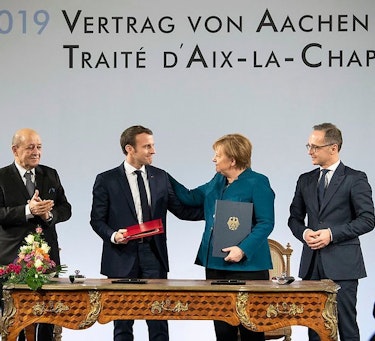Paris and Berlin: still no strategic convergence, while the big questions return

Read our newest Security Policy Library, written by Senior Researcher at the Institute for Peace Research and Security Policy at the University of Hamburg, Barbara Kunz!
While France and Germany famously have the closest bilateral relationship in the world, they never really managed to become each other’s most relevant partner in the defense field. That French and German strategic cultures are hardly compatible has been an almost platitudinous observation for decades. The two countries’ political and military cultures are very different, as well as their political systems and administrative structures. The French and German general public’s attitudes toward matters of security and defense are hardly comparable. Recent attempts at overcoming differences and a renewed ambition to cooperate, expressed in the 2019 Aachen Treaty, have had little impact on the prospects of Franco-German defense cooperation and did not lead to true strategic convergence. Defense consequently remains the neglected child of the otherwise so successful Franco-German tandem and has, despite oftentimes high-flying rhetoric, never quite worked in a way that satisfies both Paris and Berlin.
Joint Franco-German initiatives intended to advance European security therefore continue to be rare. And proposals from one side do not necessarily convince the other. The most recent French suggestions on European defense were more or less quietly rejected or ignored by Germany. Paris and Berlin disagreed on a variety of issues, such as Libya or sanctions against Turkey. The burden-sharing issues between the two countries persist, in particular with France perceiving a lack of support in the Sahel on its key partner’s part. Germany also refrained from contributing much to the debate on European strategic autonomy, while Paris considered itself the “engine” of that debate. The German EU presidency flagship project, the Strategic Compass, in turn, was not met with great enthusiasm in Paris, although the endeavor will be finalized under the French EU presidency during the first half of 2022. Moreover, President Macron’s unilateralist leanings often cause raised eyebrows in Berlin. On both sides, it is clear that the respective priorities in security and defense are not shared by the respective partner country.
Projects where Paris and Berlin truly see eye to eye are consequently more the exception than the rule. The most ambitious cooperation takes place in the industrial field – which is certainly relevant, but which does not necessarily illustrate shared strategic visions for the future of the continent’s security. Yet, developing such visions, both at national levels and bilaterally, would be needed in times of increasing uncertainty regarding U.S. engagement in European security and American security guarantees. The election of Joe Biden as U.S. president may seemingly have reduced the urgency in these questions. Most indicators, both international and American domestic, nevertheless point toward diminished U.S. engagement in European security. Franco-German cooperation and dialogue consequently should encompass three levels: bilateral projects, the advancement of existing formats of European defense cooperation and CSDP in particular, as well as developing more concrete visions for European security in times of a changing transatlantic link. Needless to say, notably the latter two categories cannot and must not be considered a purely bilateral task, but need to involve all European capitals.
Against this backdrop, this paper intends to provide an overview of major Franco-German differences that currently impact bilateral cooperation and the development of joint visions for European security in the decades ahead. It seeks to identify the causes of these differences, and, on this basis, assess the potential for strategic convergence.

Barbara Kunz
Barbara Kunz is a senior researcher at the Institute for Peace Research and Security Policy at the University of Hamburg (IFSH). She primarily works on European security and defense affairs. Prior to joining IFSH, she spent over four years as a research fellow at the Institut français des relations internationales in Paris, mainly focusing on European and Franco-German defense cooperation. Previous stations of her career include Genshagen Foundation close to Berlin, Bertelsmann Stiftung and the Centre for Baltic and East European Studies in Stockholm.
She studied political science and international relations at the Institut d’études politiques (Sciences Po) in Paris. She also holds a PhD from Stockholm University, awarded for a dissertation on US foreign policies toward Poland, Ukraine and Belarus after the end of the cold war. In the context of her doctoral studies, she was a visiting fellow at the Center for Transatlantic Relations (SAIS/Johns Hopkins University) in Washington DC.
Barbara Kunz analyses how Europeans together can respond to 21 century security challenges. The debate on European strategic autonomy and its possible declinations is currently at the heart of her interest, not least against the backdrop of a changing transatlantic relationship. In this context, she mainly focuses on the various national approaches – in particular in Germany, France and Northern Europe – and developments in relevant organizations, notably the European Union and NATO.